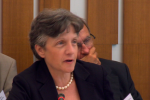Silvana ARIBA
contribution 04 -
ARBIA Silvana

transtlated version
I am sorry to speak, although I might not be in my proper quarters, but let me point out that in respect of evidence, there is well, the Prosecution has multiple interests. My experience at the ICTR has demonstrated that the Prosecution has to assess the relevant evidence because evidence is what is submitted to the judges. But before deciding whether or not to tender such evidence, it is a decision that weighs on the Prosecution. And judges in the ICTR are not those who are trying to look for the entire truth. They are just trying to ensure that the indictment is properly supported.
There is also a strategy because if evidence is not relevant, already in the Office of the Prosecutor in respect of the Office of the Prosecutor, they run the risk of having that evidence thrown out. So some material may not stand up to scrutiny and may not be compelling to the Bench and hence the evidence will not be admissible.
You also have another choice to make. Is that evidence to be disclosed or not to the Defence? And that is yet another Prosecution strategy. The evidence is relevant and the Prosecutor decides to request leave to draft an indictment. And at that stage you also have a Prosecution strategy in play, but you also have the relevance, which is important, and it is quite complex a concept, because as far as the judges are concerned, it is in the interest of justice. And in the ICTR system, let me state that what we have observed so far is that the Judges are not trying to get the entire truth. They rely on the evidence given to them in a specific case.
Another problem or issue which has been raised in financial investigations is the difficulty in demonstrating the relevance of the evidence, especially the conspiracy thesis or theory. That was quite interesting, the matter of relevance. But we were not quite successful at that stage because AndrÈ spoke extensively on that issue. But in trials before the ICTR, the financial aspect was not fully addressed and satisfactorily too by the Prosecutor and the investigators.
Let me also note a specific issue about the burden of proof, which is in place in the ICTY, because to the best of my knowledge, the Prosecutor has never had a specific interest in seeking the Defence exculpatory evidence. But since special Tribunals are a stage which have developed, in the ICC, for instance, the Prosecutor has to seek exculpatory evidence. Maybe concretely this has been done, but there hasn’t been an institutional interest in finding exculpatory evidence. And, once again, the truth is that the Judges have very little leverage in the international Tribunals.
J.M. SOREL[/fond or
Thank you for that contribution. But let me state that, from an academic point of view, generally speaking I am not speaking for myself the exculpatory or the incriminating search for the truth has been criticised. And in assessing that material on which the Prosecution would rely, there has been the issue of the role of the Office of the Prosecutor. That is from the academic standpoint, that has been highlighted, and I believe we are going to discuss that under the procedural model, and I believe the ICC on that point has kind of learned the lesson of that inequality of arms, as it were.
Yes, Ms. Conde.

